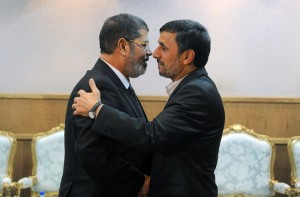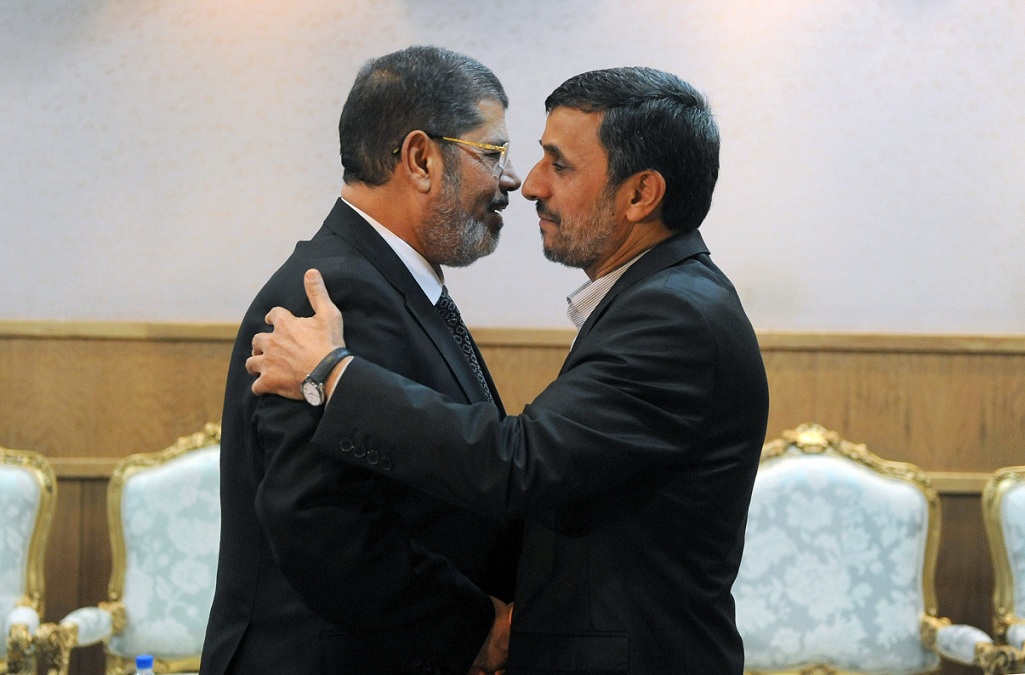
AFP PHOTO/IIPA/SAJAD SAFARI
President Mohammed Morsy’s speech at the Non-Aligned Movement (NAM) Summit in Tehran was mistranslated to sound less critical of Syria. Al Jazeera showed video of Morsy speaking and ran a translation of the Farsi audio that accompanied it. Morsy clearly stated that those who are struggling for freedom are the “Palestinians and Syrians.” However, the translation clearly said “Palestinians and Bahrainis.”
The tampered translations continue in a later part of Morsy’s speech when he said, “The Egyptian Revolution represents the cornerstone of the Arab Spring.” The Iranian translator replaces this with the words “Islamic Awakening,” a term that would bring Iran into the revolutionary fold and also add an exclusively religious label to a movement embraced by seculars and Islamists alike.
The switch from Syrians to Bahrainis is likely born out of Iran’s steadfast defense of the Bashar Al-Assad regime’s violent repression of the largely Sunni rebels, while Iran voices support for protestors in Bahrain who are largely Shi’a. Still, the willingness to tamper with Morsy’s words will not help the growing camaraderie between Egypt and Iran.
Lately, Iran has seemed almost desperate to ally with Egypt, with its foreign ministry giving a sycophantic interview to the Egyptian press. However, the translation debacle shows that Iran is having difficulty engaging honestly with their fellow Muslim power. It is reminiscent of a fake interview published by the Fars state news agency soon after Morsy’s election that claimed the newly elected leader was seeking closer ties with Iran and that he was interested in revising the Camp David accord. Not only did Morsy have to ensure the international community that the interview was false, but he had to deal with the backlash that was elicited entirely outside of his control.
The manipulation of words during Morsy’s NAM speech wandered into the realm of irony and outright offensiveness when his words “Our solidarity with the plight of the Syrian people against a repressive regime that has lost its legitimacy is not only a moral duty but one of political and strategic necessity,” was translated to, “Our solidarity with the Syrian people against the conspiracy.” Al-Assad’s regime has long attributed the uprising to an international conspiracy against itself, calling the rebels themselves “terrorist mercenaries.”
The mistranslations were compiled by Hassan Hassan, a columnist for U.A.E news outlet The National.
“The absurdity of such despotic regimes is beyond comprehension,” Hassan told the Daily News Egypt. “What is interesting is the translator’s ostensibly quick judgment to distort the speech in such a coherent way, replacing the word Bahrain with Syria and maintaining the official narrative of Tehran. I imagine they had known or guessed Morsy’s speech and prepared for it.”
Hassan said that this belligerent stance is typical of such regimes. But he adds that there could have been more intentionality behind the word-swaps, “It could be a smart move by them to say that the same could be said about Bahrain but President Morsy chose to speak about Syria’s situation, not Bahrain’s. By doing so, they say it does not matter if we distorted his speech or not, compare the two situations.”
